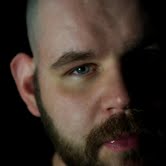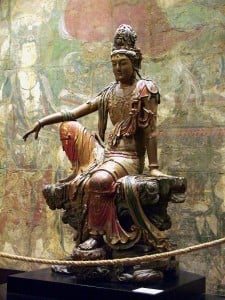This is an interview with Erick DuPree, author of “Healing our Cries” in the upcoming anthology Rooted in the Body, Seeking the Soul: Magic Practitioners Living with Disabilities, Addiction, and Illness. Himself a survivor, he wrote it as a gender inclusive ritual for others survivors of sexual trauma.

Erick DuPree
Masery: Erick, you live in Philadelphia, Pennsylvania. What is your favorite place to go there and why?
Erick: I am not sure I have a favorite place. Philadelphia is new to me, I have only lived here three years, and it is urban in a very gritty way. However I would say that any place that has trees, the sound of bees and the man I love makes me happiest.
Masery: Like most people in the Pagan community, you were participated in Christianity. In fact, you were a Pentecostal Minister. Where you raised Pentecostal? How did that religion shape your life?
Erick: I was actually raised non-denominational in the Churches of Christ, which is not the same as the United Church of Christ or UCC just to clarify. The older I get, Pentecostal has become an easier catchall phrase for lay people and I prefer it to “born again”. Pentecostals believe in baptism through emersion, the bible as the inherent and direct word of god and are considered brethren to the Church of Christ. However, the Church of Christ are far more orthodox, dogmatic, and in my opinion militant in their interpretation of scripture. Being raised in orthodox religion taught me many things, such as to seek truth and to not be ashamed that truth is the ultimate qualifier of faith. The Church of Christ teaches to read the bible as the divine and direct word of god, and as such to “speak where the bible speaks and be silent where it is silent.” To that end, I was raised that Jesus is love, that the gospel is love. And learned for myself if Paul taught as he does in Romans 8:28 that god works for the good of those called according to his purpose; then as such, god is love, it is the teaching in every gospel. However that truth, that salvation is through love, is in direct conflict with the commandment to be baptized and thus I was in conflict with scripture and in turn god. I am not ashamed of how I interpret the bible though the lens of Christianity, after all Jesus does commands his disciples to seek the kingdom in Matthew 6:33.
I am however ashamed that Jesus’ teaching are tainted by patriarchy, dogma and hate and as fate would have it, I was disfellowshipped from the Church of Christ and the lesson was resolute. My homosexuality was not the thing that ousted me from the church, but rather my love for Goddess over god, and the concept the divinity was greater than the archetypes that played out on the page. (Though, my sexual orientation, my refusal to accept baptism as the “one true way to salvation” certainly made it easy to give me the boot.)
Masery: After your time with Christianity, you became a UU Educator. What did you learn from the Unitarian Universalist Church?
Erick: Let me clarify, that there is no “after my time with Christianity”. I do not believe one turns their back on one faith experience for another. But rather that each experience is a part of an interconnected whole that is dynamic and ever evolving. When I was 14, long before I was clergy I was well immersed in Wicca for the Solitary Practitioner (knowing full well it was a ‘sin’ and not to worried). By 16, I had been baptized and “born again” and yet also had Drawn Down the Moon, aspecting the Goddess. I wasn’t confused; labels just simply didn’t affect me, as deity has always been energy.
I did not come into Unitarian Universalism looking for a faith community. I came looking for a date and stayed for the children. Arlington Street Church in Boston MA was the scene; the church is a beacon for LGBT civil rights. They had a Zen Center that was not tied to a lineage and as time progressed they were in need of someone to teach church school. I happened to have an under grad in religious education and was licensed as an educator. They hired me, and I saved the church school. Leave it to a witch and his one room schoolhouse. True story. I am not a Unitarian Universalist except by default. Reverend Kim Crawford Harvie, my mentor and friend rocked my world, but more because she and I share Zen Buddhism, a love of literature, and she had my back when no other person in my life had. By the time I was ensconced in UU educator mode, I had a solid Zen practice, both in formal trainings, was an award winning Director of Religious Education, and was working my way in magically but still not able to find the right fit.
What I learned from Unitarian Universalism is that it is a perfect place for to explore free of judgment but I feel at times can lack the solidifying praxis needed for adult faith formation. However I think it is ideal for children, especially those whose parents are afraid of church school due to previous religious trauma. For children, Unitarian Universalism is ”the church of the open mind, loving hearts and helping hands.” All UU children all learn love universal love.
Masery: I find Zen Buddhism to be a very enlightening and philosophical religion though I haven’t studied it as much as you have. What does Zen Buddhism mean to you?
Erick: Sit or zazen
Masery: You studied Zen Buddhism with Roshi Pat Enkyo O’Hara who serves as Abbot of the Village Zendo in New York. When did you meet? How did you meet and what is she like? How did she impact your life?
Erick: I met Roshi at Kripalu retreat center in Lennox, MA in 2006 when I was finishing my yoga certification. I have had the fortune to sit many times in her company. I do not know what she is like and she has not impacted my life. The relationship of Dharma teacher in traditional Zen, of which I am not a formal student of Roshi, does not lend itself to a closeness that westerners often relate to. Unlike Reverend Kim for example, whom I have at times felt almost maternal about, Roshi is simply Roshi. I take refuge in her teachings and not in her. I have no attachment to her, other than as an example of someone who lives a life of Zen.
Masery: Ten years ago you became a part of the Feri Tradition of Paganism. How did you discover it? What is your practice like?
Erick: I came to Feri through Reclaiming Collective that I encountered through The SpiralDance by Starhawk. I discovered the principles of Feri by reading Evolutionary Witchcraft by T. Thorn Coyle and then hobbling around through other books. Looking for what I thought to be more “witchy witchcraft” I began classes with a Cabot tradition. That was interesting, but definitely not the same as Thorn’s book. Perchance, a book group on Mists of Avalon of all things put me into encountering an Andersen Feri tradition. I stayed within that tradition, very loosely for about 7 years dabbling with Hermetic Qabala and continuing with things I had learned in Reclaiming Collective. I identified first with Reclaiming, but ‘initiated’ within the Feri. Reclaiming gave me the Goddess as I understand Her best and Feri gave me a magical foundation. I did this all while sitting in formal meditation with a Boundless Way Zen Center in Boston, (which indirectly is an offshoot of the same lineage of Roshi O’Hara’s, but I didn’t know that at the time)
I left my Feri when I moved to Philadelphia in 2010.
Today, my journey has taken me full circle. I have a deep relationship with the Queen of Heaven whom poor Jeremiah tried to smite out in the bible by the god of Abraham. He failed… She is still worshipped by millions. I am still rooted in a zen practice, but am clearly a witch. I joke with the expression Zen Mind Witch Heart. My practice is contemplative, my magic is often simple and I find myself getting more involved in the tech process of magic. For example, how the practices in Thelema and Heretic Qabala overlap East Asian and Buddhist teaching. Ultimately, I live a magical life, whereas for a long time I think magic was a piece of the whole and today it is now the incarnate whole.
Masery: I must say you’ve done a lot of seeking and learning on your spiritual road. You’ve also been a student of T. Thorn Coyle. What is the most important thing you learned from her?
Erick: The most important thing I leaned from Thorn is to give myself permission to dare.
I would also like to say at some point in the learning process books stop being enough. I needed more. It’s not easy to go from page scholar to teacher/student relationship. The leap has a small cost associated with it, however I have found that my time with various teachers, Thorn included, has impacted my magical journey profoundly.
Masery: In the anthology Rooted in the Body, Seeking the Soul: Magic Practitioners Living with Addiction and Illness, you wrote the essay “Healing Our Cries”. It talks about the trauma you experienced due to childhood incest. I understand if you don’t wish to talk about it now. How did you find the courage to submit that piece to something that would be read publicly?
Erick: It’s really interesting to come full circle here because I do not consider myself a person with an illness and I do not have an addition; so it was hard for me to get past the title of the anthology to submit the piece. However, what is known is that a large number of trauma survivors often fall victim to addiction and or mental illness, especially severe depression and alcoholism. And so, I wrote it first for them. For their cries, at whatever stage of healing they are at. Goddess hears you.
I wrote it also for men whom are survivors of sexual trauma. They too have a story that is rarely told. They need a ritual that gender inclusive, one that does not make men the default perpetrator. For their cries, even if they deny their trauma to others, this ritual is safe for them. They too are Goddess, and she hears them.
I wrote as our history, our roots in the mysteries of Persephone and Hecate and as a testament of my own truth. I am more than an incest survivor; I am a survivor of acute complex trauma. The ritual is designed to help exorcize the cries of all parts of the trauma associated with sexual assault, besides “the act.” It is for the ‘other stuff’ that no one ever talks about, the rage, the shame; the people who “ignored it” for all the years… It is for that reason I wrote the ritual. This ritual is a tool to release the cries and move on. Goddess is the tears and the release.
I did not have to find the courage but rather the appointed time to tell the story. The Charge of the Goddess reminds us “for that which we seek we find not in ourselves we will never find it without.” Simply put, She destined it to be written in this anointed time.
Masery: You practice yoga and teach trauma survivors. How has yoga helped heal you?
Erick: Yoga grounds me back into my body, regulates my breath, and aligns my soul. (I like to augment my Ashtanga yoga with the triple soul alignment, from the Feri tradition naturally!)
Yoga for trauma survivors is not a school of yoga but specialized training in sensitivity. There is no clinical reason why, just clinical documentation that yoga postures or asana open the body and release emotion. This coupled with psychotherapy has dramatically changed the lives of trauma survivors.
Masery: What is one of the moving moments you’ve shared with a student?
Erick: Like my relationship with Roshi, I carry a similar boundary in yoga. My role is simply to bring asana, or postures. I find that if students keep the breath, when we get to Balasana or child pose it’s always the one where the tears come. When that happens, I place my palm on the back letting them know I am there. They know in advance I will do this. When class is over, I say “Good yoga and blessed be”. I do not acknowledge the trigger or the tears, just the yoga. It’s always good yoga and I never say namaste.
Masery: You have a close relationship with the Goddess. Share your inspiration for your website and where people can go to see your art.
Erick: AloneinHerPresence.com is my website that started as a pen and paper repository of my musings about Goddess. As I continue to endeavor, “Where Shall Wisdom Be Found?” on my journey, the site is where I share with the world my process. At this stage, my spiritual path is an evolution of sorts, part blog, part inspiration, and part gallery of my sculpting.
Despite where I am today, my practice is still intentionally very much solitary. At this moment, I choose to walk alone and I choose to walk along side. However I choose not to be coven bound or to lead. That said, I choose to always bring the dharma.
I am really about the exploration of sacred, and the rites that bring us when we are called into communion with self and by extension into deepest communion with Her.
The other place to find my work is my Etsy store Goddess Guy. Also you can friend me on Facebook.
Rooted in the Body, Seeking the Soul: Magic Practitioners Living with Disabilities, Addiction, and Illness will be available in later this year or in early 2014. If you would like to be notified please contact Tara “Masery” Miller at tara.miller21 (at) gmail.com















